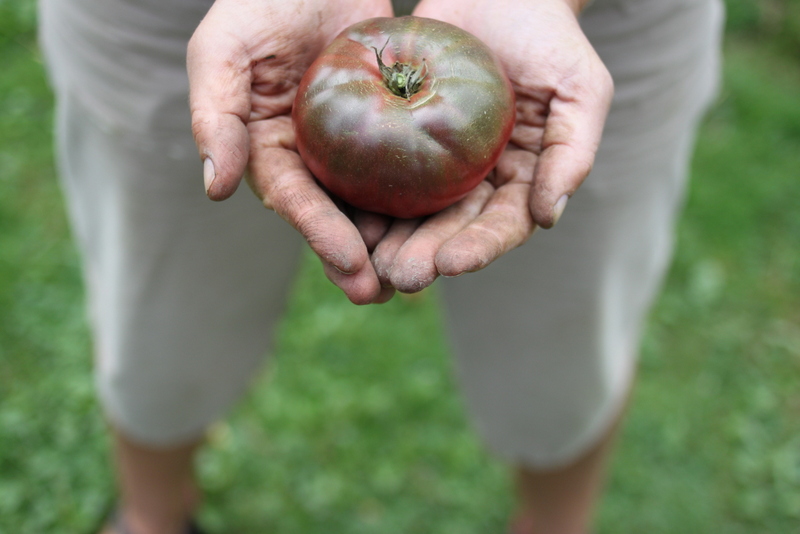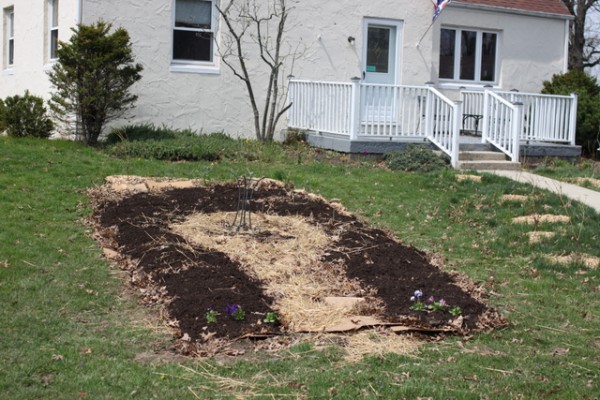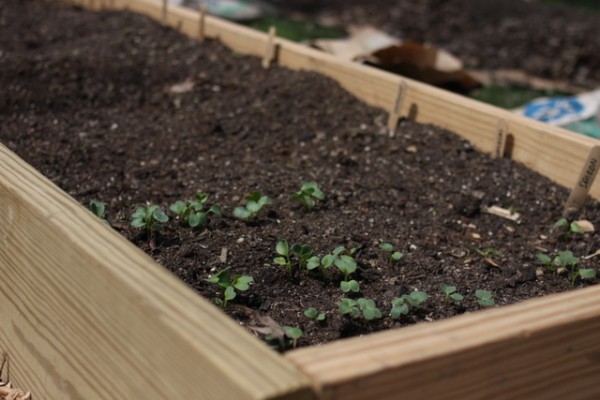Video of foraging for wild nettles
Read moreTurn Here Sweet Corn {Book Hounds}
 The Ohio Ecological Food and Farm Association announced their keynote speakers for the annual conference recently. I read the biographies and requested Atina Diffley's book Turn Here Sweet Corn: Organic Farming Works
The Ohio Ecological Food and Farm Association announced their keynote speakers for the annual conference recently. I read the biographies and requested Atina Diffley's book Turn Here Sweet Corn: Organic Farming Works
Diffley weaves many useful farming tips from her Gardens of Eagen farm into her writing. She advocates that "weeds are not our enemies but our allies, nature's system to protect, repair, and purify the soil," and then goes on to describe how to build organic soil from conventional fields. She tells how her successful organic farm plants in succession, weeds, and markets their wares in enough detail to be useful to current and would-be organic farmers, but in a story-telling fashion that would not bore a non-farmer.
Beyond being an interesting story, Turn Here Sweet Corn is inspirational to me as a maybe farmer. Diffley describes a life that is physically and mentally challenging but incredible rewarding. She advocates for the utmost of integrity, writing "our name is on it, and quality is crucial, but it's not just that. We enter people's lives in the most sacred way possible. Our hands touch every vegetable that leaves this land. This food enters the eaters' lives through their mouths and nourishes their bodies. I need to be sure that every piece of food that leaves here is good." Watch the book trailer below to hear more about Turn Here Sweet Corn in Atina's own words.
Registration for the 2014 OEFFA conference will open in about a month. Alex and I will present a workshop on pressure canning (more details to come) and I can't wait to be in the audience for Atina Diffley's keynote.
Am I A Farmer?
 I grow food on my land. I share this food with people well beyond my family. I work in the soil ten hours a week with Swainway Urban Farm and sell our mushrooms and microgreens at farmers' markets. My hands are dirty all the time. All these are good signs that I might be a farmer.
But yet I resist this label and I want to unpack why.
I grow food on my land. I share this food with people well beyond my family. I work in the soil ten hours a week with Swainway Urban Farm and sell our mushrooms and microgreens at farmers' markets. My hands are dirty all the time. All these are good signs that I might be a farmer.
But yet I resist this label and I want to unpack why.
For a long time, my excuse was that a farmer sells their food, and I didn't, so I couldn't be a farmer. But now, I do grow and sell food for Swainway and I've given my family and friends in excess of $500 worth of food this season.
Farming, if I'm a farmer, is certainly not my primary occupation - I write, teach cooking classes, mother, and volunteer. That's why I've been drawn to the word homesteader. I could also be a 'hobby farmer' but that seems to devalue the work of farming. Yes, I might not grow food and raise chickens for profit, but an hour of bed building is the same whether the eventual tomatoes go to market or are consumed at home.
The biggest resistance in my mind is that I don't think of farmers and farming organizations as representing the food growing system I want to see. Farmers are people who drive tractors and own many acres and raise meat in feedlots and file for government subsidies and use chemical fertilizers and plant gmo seeds. I spend enormous effort and money to feed those I love with food that doesn't come from the typical American farm. If I call myself a farmer, I'm afraid that people will think I'm one of the conventional types.
Beyond the fact that I oppose the growing practices of the vast majority of American farmers, I feel like I don't fit in with the traditional farming lifestyle. I live in the city. I hold liberal values. I have a bachelor's degree in geological science and constantly pursue additional education through reading, conferences, and classes. I don't think anyone would describe me as a bumpkin or yokel, the third definition of farmer as provided by Merriam-Webster.
It makes me a little sad that when I think of a farmer, I think of something I don't want to be. No matter advances in technology, people will always need to eat. The number of people who farm as an occupation has declined steadily in the last few decades but our population needs real food. Somehow, smart, hard-working, earth-minded growers (like me?) must reclaim farming as an honorable avocation.
What say you: am I a farmer?
Eggs In Every Basket - Gardening 2013
Unlike 2012, and 2011, and 2010, we have no garden plans this year.
We certainly have lots of seeds and lots of seedlings and lots of perennial edibles. But instead of a predestined place, our strategy seems to be "this plant will die if it doesn't go in the ground now, better build a bed!"
So it was with the hoophouse - we invited people over for a build and later decided we should actually use the thing. We layered soil and peat moss over cardboard and planted cold-hearty vegetables.
Then strawberries were available at City Folk's Farm Shop. Oooh! We want to grow those but where to put them? Hoophouse sounds good and perhaps the plastic will protect the sweet berries from hungry rodents and birds.
Same with the potatoes and onions. The time to plant came upon us and we quickly put together the first pieces of a keyhole garden for family vegetables.
The placement of the orchard, in a sunny, well-drained location toward the rear of the property, was set in our minds a few months ago. We planted there in rows for lack of a better idea. We hope to eventually put in alley crops and understory edibles ala Restoration Agriculture. If the deer ravage the back orchard, we're raising three fruit trees in the chicken yard for insurance.
So far, we've double dug planting holes, tilled beds, built a hugelkultur pile (more on that later), built a raised bed for root vegetables, and made many lasagna-style beds including Lil's garden pictured below. Our soil building materials included straw, Price Organics premium soil blend, and Zoo Brew from City Folk's Farm Shop, peat moss from the big box hardware store, and composted leaves and rabbit poo salvaged from yards.

Garden Goals
Though we don't have a pretty plan, we do have a clear set of long-term goals:
1) Convert lawn to growing edible, habitat, or ornamental plants
2) Choose perennial and native varieties wherever possible
3) Plant a diversity of species in a diversity of growing spaces
4) Co-exist with the natural environment including remediating low areas to more wetland-like habitat
5) Garden with ecological and permaculture principles in mind
6) Save seeds for economy, biodiversity, and micro-climate adapatation
Ultimately, we want to provide our family with a sustainable, year-round food supply and welcome others to learn from the example gardens we create.
Consequences of Experimental Gardening
This seemingly haphazard way of planting may or may not work out for us. Certainly some plants will thrive while others may not be so lucky. Our gardening eyes may be bigger than our stomachs in terms of how many beds we can feasibly plant with the time and resources we have.
But at the end of the year, I expect we will have learned a lot about what works in the conditions we have. The eggs-in-every-basket strategy to building beds and planting over a hundred varieties of edibles will be a sort of instant natural selection. Perhaps we'll learn that deer prefer the branches of apple trees to pear trees. Or that strawberries don't receive enough pollination to fruit in the hoop house. Or that no one but humans likes collard greens.
It's all too early to tell now. Having the patience to wait and see which eggs hatch is one of the life lessons of gardening.

